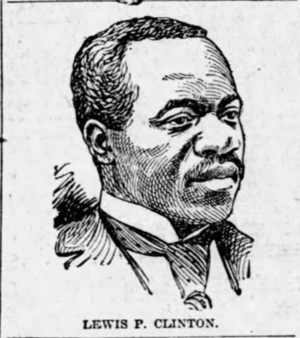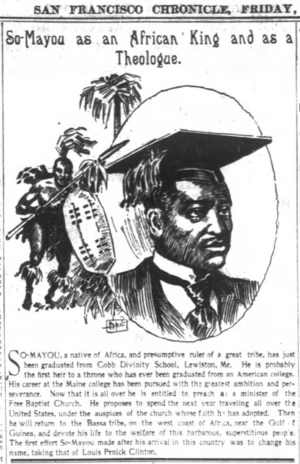Lewis Penick Clinton facts for kids
Lewis Penick Clinton was a special person. He was born a prince in West Africa, in a country called Liberia. His original name was Prince Somayou Zea Clayou. Later, he became an African American missionary and a speaker who shared his story. He was born around 1865 or 1866.
A Prince's Early Life
Clinton was born as Prince Somayou Zea Clayou. This was in 1865 or 1866. He was born in a place called Grand Bassa in Liberia. He was supposed to become king after his grandfather, Zea. His grandfather was the king of the Bassa people. This was a very large group of people in West Africa.
Somayou's father was also a king. His mother was his father's favorite wife. An uncle wanted to take the throne instead of Somayou. So, Somayou was trained in secret to be the next leader. But his father died in 1878. Somayou feared for his life. He ran away to the Liberian coast. There, he met an American trader named Clinton. Mr. Clinton taught Somayou how to speak English.
Later, Somayou met an Episcopal bishop. This meeting happened on a road between Cape Palmas and Cape Mount. The bishop's name was Lewis Penick. He was on his way to start a mission. Somayou worked with the bishop for five years. During this time, he took on the name "Lewis Penick Clinton."
Learning in America
In 1884, Clinton wanted to learn even more. So, he traveled to the United States. He studied at Storer College in West Virginia. He was there for five years, starting in the 1880s.
By 1890, Clinton moved to Maine. He spent one year at Nichols Latin School. After that, he went to Bates College. He also attended its special school, the Cobb Divinity School. He studied there for six years. In 1897, he graduated from Bates College's Cobb Divinity School. He finished with very high honors.
While at Bates, Clinton was very active. He was part of the Polymnian debating group. He also enjoyed social events and sports, like tennis. He even wrote for the school newspaper, the Bates Student. Clinton paid for his education by giving lectures and writing. He learned many languages. These included English, French, German, Latin, Greek, and Hebrew. He also knew African languages like Bassa, Kru, and Vai.
Helping Others in Liberia
In 1898, Clinton became a Free Will Baptist minister. He went back to Africa in 1899. His goal was to start a mission. This mission was near Fortsville in Grand Bassa, Liberia. He wanted to help educate local men and women. He also hoped to get his family's throne back from his uncle.
The Free Will Baptists in Maine supported his mission work. Clinton started a mission station and a farm. It was seventy-five miles east of Monrovia. It was also fifty miles from the coast. The Bassa people and the Liberian government gave him hundreds of acres of land. Another student from Storer College, Rev. A.K. Peabody, later helped him.
The mission grew over time. It had dormitories (places to sleep) and farms. It taught people about farming, mechanics, and spiritual lessons. These lessons were taught in English. This was because the Bassa written language had not been created yet. Besides the native Bassa people, many Americo-Liberians also sent their children to his school.
In 1917, the Northern Baptist Convention sent a professor from Bates College, Lyman Jordan. He officially opened the Bible Industrial Academy at the mission. In 1910, Clinton briefly returned to the United States. He gave lectures about his work. One talk was to the Baptists at Ocean Park, Maine. Another was at Clark University in Massachusetts. It was called "The Hinterland of Liberia."
 | James B. Knighten |
 | Azellia White |
 | Willa Brown |



